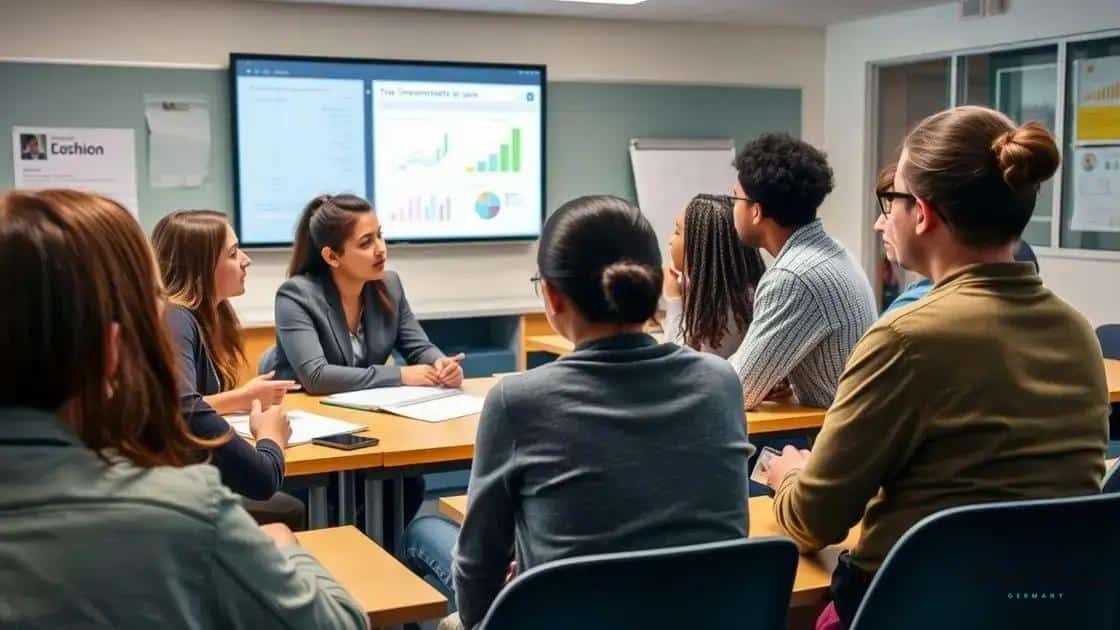The growing demand for sustainability-focused degrees

The growing demand for sustainability-focused degrees reflects the urgency to address environmental issues, presenting students with diverse career opportunities in fields like conservation, renewable energy, and sustainable business practices.
The growing demand for sustainability-focused degrees is reshaping education pathways. With increasing awareness of environmental issues, more students are looking for ways to make a positive impact. Are you one of them?
Understanding sustainability-focused degrees
Understanding sustainability-focused degrees can greatly impact your career path and the world around us. These degrees address critical environmental issues and prepare students for meaningful, responsible work.
What are Sustainability-Focused Degrees?
Sustainability-focused degrees are programs designed to educate students on the principles of sustainability, environmental stewardship, and social responsibility. They blend various fields such as science, business, and social sciences, giving students a well-rounded education.
Examples of Popular Programs
- Environmental Science
- Sustainable Business Management
- Renewable Energy Technology
- Sustainable Urban Planning
Students in these programs learn not only about ecosystems but also about how businesses can operate in an eco-friendly manner. The goal is to equip them with the skills needed to address today’s urgent challenges.
Benefits of Choosing a Sustainability Degree
Pursuing a degree centered on sustainability offers several advantages. For starters, graduates often find themselves in demand across various industries. Companies increasingly seek individuals who understand how to implement sustainable practices.
- Growing job market in fields related to sustainability
- Positive impact on communities and the environment
- Skill development for various sectors
Another benefit is the opportunity for personal growth. Engaging with like-minded individuals passionate about making a difference creates a supportive educational environment. You’ll not only gain knowledge but also forge connections that can last a lifetime.
Key Skills Acquired
Sustainability-focused programs teach important skills necessary for building a sustainable future. Some of these skills include critical thinking, problem-solving, and effective communication.
Additionally, students often engage in hands-on projects, giving them practical experience. These experiences enhance their resumes and prepare them for real-world challenges.
Choosing a sustainability-focused degree can be a powerful step towards a rewarding career. As awareness of environmental issues grows, the need for educated professionals in this field continues to expand.
The rise of environmental studies programs

The rise of environmental studies programs reflects a growing awareness of our planet’s needs. These programs are more popular than ever as students seek to address pressing environmental challenges.
Growth in Enrollment
Many universities are experiencing significant increases in enrollment for these programs. As concerns about climate change, pollution, and biodiversity loss heighten, more students are pursuing degrees that can lead to impactful careers.
- Students are eager to learn about the interconnectivity of ecosystems.
- Courses often include hands-on learning experiences, which attract more applicants.
- Many programs emphasize real-world applications, preparing students for global challenges.
Alongside the increase in enrollment, there is also a rise in dedicated faculties and resources. Universities are investing in research and facilities related to environmental studies, creating an enriching learning environment.
Curriculum Changes
With the rise of these programs, curriculum changes are essential. Programs are now offering interdisciplinary approaches that combine science, policy, and technology.
This development allows students to explore various aspects of the environment, leading to well-rounded graduates. They learn not just the science behind environmental issues but also advocacy and sustainable practices.
Courses focus on current challenges like climate resilience, sustainable agriculture, and renewable energy technologies. The variety of courses keeps the content relevant and engaging for students.
Career Opportunities
Graduates from environmental studies programs find ample job opportunities. Fields such as conservation, sustainability consulting, and education are just a few options available.
- Non-profits focused on environmental protection
- Government agencies seeking sustainability experts
- Corporate sustainability roles in various industries
These professionals are vital in promoting sustainable practices across all sectors, making their training invaluable.
Career opportunities in sustainability
Career opportunities in sustainability are expanding rapidly as businesses and organizations recognize the importance of environmental stewardship. Professionals in this field are essential for driving change and innovating solutions.
Types of Careers
Many sectors are eager to hire sustainability experts. Some common career paths include:
- Environmental Consultant: These professionals help organizations develop sustainable practices and reduce their environmental impact.
- Sustainability Manager: This role involves overseeing a company’s sustainability initiatives and ensuring compliance with regulations.
- Renewable Energy Specialist: Focused on innovations in renewable sources, these experts work towards sustainable energy solutions.
- Conservation Scientist: Often employed by government agencies or NGOs, they work to protect natural resources and wildlife.
Along with these specific roles, positions in education, governmental policy, and corporate responsibility are also prominent. Each of these careers contributes to a larger movement towards environmental sustainability.
Skills Required
To thrive in these careers, certain skills are particularly valuable. These include critical thinking, data analysis, and effective communication.
Critical thinking allows professionals to tackle complex environmental issues creatively. Data analysis helps interpret research findings, while communication ensures that sustainable practices are clearly conveyed within organizations and to the public.
Many sustainability jobs also require knowledge of environmental regulations and laws. Keeping up to date with the latest trends in sustainability practices is crucial for career advancement.
Networking and Professional Development
Networking within the sustainability sector can provide significant career benefits. Joining professional organizations or attending conferences can lead to valuable connections and opportunities.
- Engaging in internships can also provide hands-on experience.
- Participating in workshops allows for skill enhancement.
- Collaborating on projects encourages teamwork and innovation.
As more companies integrate sustainability into their business models, the demand for qualified professionals in this field will only continue to grow, making it a rewarding career choice.
Challenges in pursuing sustainability education
Pursuing a degree in sustainability education offers many benefits, but it comes with its own set of challenges. Students often face hurdles that can make their educational journey difficult.
Financial Constraints
One major challenge is the cost of education. Tuition and fees for sustainability programs can be high, making it difficult for some students to enroll.
- Financial aid options may not cover all expenses.
- Students might incur debt that affects their future choices.
- Limited scholarships are specifically available for sustainability studies.
These financial pressures can limit the accessibility of these valuable programs for many students.
Complexity of the Field
The field of sustainability is incredibly broad and constantly evolving. This complexity can be overwhelming for students trying to navigate their educational paths.
Understanding the interconnections between environmental, social, and economic issues requires a diverse knowledge base. As a result, students may need to take courses across multiple disciplines.
Balancing Coursework and Practical Experience
Another challenge is finding a balance between coursework and hands-on experience. Practical learning opportunities are essential for students to apply their knowledge.
- Internships can require significant time commitments, which can conflict with academic schedules.
- Students may struggle with finding relevant internships due to competition and limited availability.
- Real-world projects often require a team, which can complicate coordination.
This balance is crucial for developing the skills needed in the workforce but can be hard to achieve.
Keeping Up with Rapid Changes
The sustainability landscape is continuously changing, with new technologies and regulations emerging. Keeping current with these trends can be a significant challenge.
Students must actively seek out information and adapt their learning strategies to stay relevant. This requirement places additional pressure on them during their studies.
How to choose the right program
Choosing the right sustainability program is crucial for your career. With many options available, it’s important to consider key factors that will guide your decision.
Identify Your Goals
Start by identifying what you want to achieve with your degree. Knowing your career goals helps in selecting a program that aligns with your interests.
- Are you interested in environmental policy?
- Do you want to work in renewable energy?
- Is conservation your passion?
Understanding your motivations can narrow down the best options for you.
Consider Program Accreditation
Accreditation plays a big role in the quality of education. Look for programs that are accredited by recognized organizations. This ensures that the curriculum meets industry standards.
- Accredited programs are often more respected by employers.
- They may provide better networking opportunities.
- Graduates might have an easier time finding jobs.
Doing your research on accreditation can save you from potential setbacks later in your career.
Evaluate the Curriculum
Next, look at the curriculum offered by each program. A well-rounded program should include both theoretical knowledge and practical experience.
Check how many hands-on opportunities, such as internships or fieldwork, are available. Practical experiences are essential for applying what you learn in class.
Look at Faculty Expertise
The quality of instructors can significantly impact your education. Investigate the faculty’s background and expertise in the field. Faculty members who are active in research or industry can provide valuable insights.
Consider reaching out to current students or alumni to learn about their experiences with the faculty. This can give you a better sense of what to expect.
Compare Costs and Financial Aid Options
Lastly, financial considerations are vital when choosing a program. Evaluate tuition costs and available financial aid. Look for scholarships and grants specifically for students in sustainability.
- Some programs may offer assistantships to help with costs.
- Understand the total expenses, including books and materials.
Balancing the cost with the potential benefits of the program is important for your financial future.
FAQ – Frequently Asked Questions about Choosing Sustainability Programs
What should I consider first when choosing a sustainability program?
Start by identifying your career goals. Knowing what you want to achieve can help you select a program that aligns with your interests.
How important is accreditation for sustainability programs?
Accreditation is very important as it ensures that the program meets quality standards recognized by the industry and can enhance your job prospects.
What role does practical experience play in sustainability education?
Practical experience, such as internships, is crucial as it allows you to apply your knowledge and develop skills needed in the field.
Are there financial aid options available for sustainability programs?
Yes, many programs offer scholarships, grants, and assistantships to help students manage tuition costs and make education more accessible.





